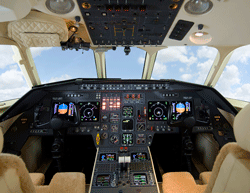Contributed by guest blogger Philip J Reed, Redstone College

With a degree in avionics, the most advanced aviation avionics technology is at your fingertips. Literally.
Aviation has a long history, and it’s a field that has only grown more sophisticated with time. If you catch yourself looking up every time an aircraft flies overhead and are fascinated with how fast technology is changing, it may be time to combine your passions and seek a career in aviation avionics. Here are some reasons people find the profession appealing.
Science & Technology Excite You
Aviation avionics technicians work with the most advanced and sophisticated technology today. Avionics systems aboard an aircraft include aircraft navigation and radio communications, weather radar systems and other instruments and computers that control flight, engine and other primary functions. The training to become a qualified in this field encompasses several subjects. In school, students will study radio communication theory, avionics systems line maintenance, and avionics system integration. Avionics students also benefit from an intensive study of math, physics, computer science, electronics, mechanical drawing and other similar disciplines because aircraft are complex machines.
You Thrive on Responsibility
Avionics technicians keep the world's aircraft flying safely and efficiently. Avionics systems are an integral part of aircraft design and newer technologies are continually integrated to increase an aircraft’s capability and safety. The expertise and training of an avionics technician keeps thousands of travelers safe in the air on a daily basis. Students completing electronics/avionics courses receive a Federal Aviation Administration (FAA) certification.
Quality Schools Available
The 2010–2011 edition of the Occupational Outlook Handbook notes that there are approximately 170 FAA-certified schools in the United States, and about one-third offer degrees in avionics, aviation maintenance management, or aviation technology. By law, certified mechanic schools must provide students with at least 1,900 class hours, which usually takes between one and two years to complete and also includes instruction in how to use tools relevant to the job.
Improving Your Job Prospects
While some avionics technicians are able to learn their skills through on-the-job training, most will find that they require formal avionics training to develop the skills necessary to be successful in their work. Technological advances have changed the face of avionics, and it’s important that new avionics professionals have relevant training to meet these demands.
Career Options
Because avionics is involved in everything aboard an aircraft, including engines and flight controls, the aviation industry needs skilled individuals with aircraft avionics training. Avionics technicians may find themselves involved in testing, calibrating, troubleshooting and repairing avionics instruments. Avionics jobs may also require candidates to inspect and maintain electrical systems as well as set up and perform bench tests, repairs and replace defective components such as tachometers, temperature gauges and altimeters, as well as read electrical wiring diagrams. Graduate and post-graduate degrees generally aren’t available in avionics, but some people choose to move on to earn an engineering degree.
If you’re a thorough person with the self-motivation and work ethic required to have a good career, you could be a good fit for work in avionics. Study hard, and keep learning to give yourself the best prospects possible.
Philip Reed works in affiliation with Redstone College, located in Denver, CO. He has two years experience working with online colleges and communications systems. Situated on the front range of the Colorado Rockies, Redstone College, is located in Broomfield, a small town between Denver and Boulder.


